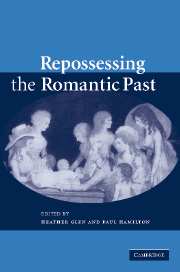Book contents
- Frontmatter
- Contents
- Notes on contributors
- Introduction
- PART I DISSENT AND OPPOSITION
- 1 ‘Severe contentions of friendship’: Barbauld, conversation, and dispute
- 2 Hazlitt's visionary London
- 3 Shelley's republics
- 4 Memoirs of a dutiful niece: Lucy Aikin and literary reputation
- 5 Holding Proteus: William Godwin in his letters
- PART II REOPENING THE CASE OF EDGEWORTH
- PART III DIFFERENT DIRECTIONS
- Marilyn Butler: a bibliography
- Index
3 - Shelley's republics
Published online by Cambridge University Press: 15 December 2009
- Frontmatter
- Contents
- Notes on contributors
- Introduction
- PART I DISSENT AND OPPOSITION
- 1 ‘Severe contentions of friendship’: Barbauld, conversation, and dispute
- 2 Hazlitt's visionary London
- 3 Shelley's republics
- 4 Memoirs of a dutiful niece: Lucy Aikin and literary reputation
- 5 Holding Proteus: William Godwin in his letters
- PART II REOPENING THE CASE OF EDGEWORTH
- PART III DIFFERENT DIRECTIONS
- Marilyn Butler: a bibliography
- Index
Summary
For Shelley, the stay at Marlow in 1817 was unforgettable, but perplexingly so. In April 1818, recently arrived in Milan, he wrote to Thomas Love Peacock about the tenacity of his memories of the place:
I often revisit Marlow in thought. The curse of this life is that whatever is once known can never be unknown. You inhabit a spot which before you inhabit it is as indifferent to you as any other spot upon the earth, & when, persuaded by some necessity you think to leave it, you leave it not, – it clings to you & with memories of things which in your experience of them gave no such promise, revenges your desertion. Time flows on, places are changed, friends who were with us are no longer with us, but what has been, seems yet to be, but barren & stript of life. See, I have sent you a study for Night Mare Abbey.
That final allusion to the satire Peacock had just begun shows Shelley's self-mocking awareness of the Gothic possibilities of this melancholy medi–tation. But the passage also demonstrates his characteristic alertness to the unpredictable ways in which the past appears to possess the present even as the desire to repossess that past absolutely is frustrated. The eerie hold upon the mind of a previously inhabited place evidences the impossibility of ‘unknowing’ but, with equal force, temporal continuity is exposed as an empty illusion: ‘what has been, seems yet to be, but barren & stript of life’.
- Type
- Chapter
- Information
- Repossessing the Romantic Past , pp. 63 - 79Publisher: Cambridge University PressPrint publication year: 2006

